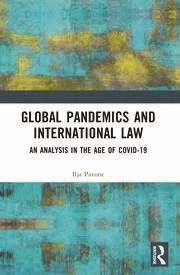Global Pandemics and International Law: An Analysis in the Age of Covid-19
Ilja Pavone
£42.99, Routledge
★★★✩✩
If international law has a unifying principle, it is sovereignty. The idea that states have freedom of action within their jurisdictions goes back to at least the Peace of Westphalia in the 1640s. Modern international relations are more complex than the questions arising in 17th-century Europe, and many more issues of international legal concern are likely to affect states collectively. One such area is pandemic disease, as Covid demonstrated.
The work begins by describing the legal architecture, linked to the World Health Organization (WHO). The organisation has primary responsibility for monitoring health threats, declaring when a health issue gives rise to international concern and coordinating responses between states.

Pavone then addresses three failures that created the Covid crisis. He claims the WHO itself acted too slowly in escalating matters as information came in and, crucially, failed to challenge what appeared to be a lack of accurate information coming from the Chinese government. China is criticised for its failure to act in good faith, and lack of transparency and openness. However, member states themselves come in for criticism for lack of preparation, slow responses and self-interest.
The remainder of the work considers how the response to future pandemics may be improved. The author focuses in particular on the One Health agenda, which takes a holistic approach to human health and environmental protection – with particular emphasis on the trade in wild animals, given the hypothesised link between Covid and wildlife markets. He comments on the use of vaccinations, both compulsory vaccination within states and the consequences of wealthier nations purchasing and hoarding vaccines. Finally, he addresses the newly concluded Pandemic Treaty. This is intended to improve planning at an international level and coordinate domestic responses, as well as create mechanisms for increasing access to health products for poorer countries.
Covid exposed significant shortcomings in international pandemic responses. Pavone makes good points and sets out a reasonable reform agenda. However, his proposals inevitably require increased international regulation and for states to cede at least some of their freedom of action. This collides with the principle of sovereignty, so jealously guarded in international law. A worthy set of ideas, but one may ask whether the level of state cooperation is achievable.
James E Hurford is a solicitor at the Government Legal Department, London































No comments yet